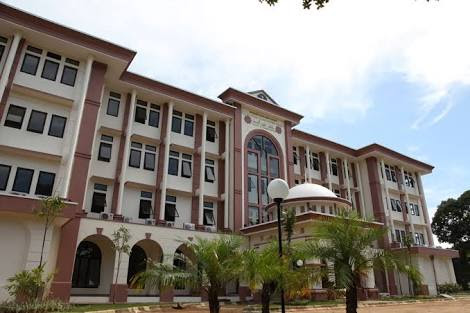IMPLEMENTATION OF THE MERDEKA CURRICULUM THROUGH THE APPLICATION OF THE PROJECT-BASED BLENDED LEARNING MODEL IN MATHEMATICS LEARNING
IMPLEMENTASI KURIKULUM MERDEKA MELALUI PENERAPAN MODEL PROJECT-BASED BLENDED LEARNING DALAM PEMBELAJARAN MATEMATIKA
Abstract
This study aims to determine the effect of the implementation of the project-based blended learning model on improving students' mathematics learning outcomes as the implementation of the independent curriculum in mathematics learning. The research method used is quasi-experimental which consists of an experimental class and a control class. The experimental class applied the project-based blended learning model in learning mathematics, and the control class did not use the project-based blended learning model in learning mathematics. The instrument used is the test of students' mathematics learning outcomes given before and after the implementation of learning. The data analysis used was descriptive statistical data analysis and inferential statistical data analysis which consisted of the normality test, homogeneity test, and independent sample t-test for hypothetical testing using the N-gain value. The results of the data analysis show that the significance obtained is 0.000 <0.05 or in other words, H0 is rejected, so it can be concluded that there is a significant effect of applying the project-based blended learning model to improving students' mathematics learning outcomes.
Downloads
References
Arifin, M., & Abduh, M. (2021). Peningkatan motivasi belajar model pembelajaran blended learning. Jurnal Basicedu, 5(4), 2339–2347. https://doi.org/10.31004/basicedu.v5i4.1201.
Ayu, R., Tri, A., & Hartati, R. (2019). Analisis kemampuan berpikir kreatif peserta didik melalui penerapan blended project-based learning. Inovasi Pendidikan Kimia, 13(2), 2437–2446. https://doi.org/10.15294/jipk.v13i2.19562.
Azizah, A. N., & Wardani, N. S. (2019). Upaya peningkatan hasil belajar matematika melalui model project based learning siswa kelas V SD. Jurnal Riset Teknologi & Inovasi Pendidikan (Jartika), 2(1), 194–204. Retrieved from http://journal.rekarta.co.id/index.php/jartika/article/view/280.
Cholilah, M., Tatuwo, A. G. P., Rosdiana, S. P., & Fatirul, A. N. (2023). Pengembangan kurikulum merdeka dalam satuan pendidikan serta implementasi kurikulum merdeka pada pembelajaran abad 21. Sanskara Pendidikan dan Pengajaran, 1(02), 56-67. https://doi.org/10.58812/spp.v1i02.110.
Eliyasni, R., Kenedi, A. K., & Sayer, I. M. (2019). Blended learning and project based learning: the method to improve students’ higher order thinking skill (HOTS). Jurnal Iqra': Kajian Ilmu Pendidikan, 4(2), 231-248. https://doi.org/10.25217/ji.v4i2.549.
Fahlevi, M. R. (2022). Kajian project based blended learning sebagai model pembelajaran pasca pandemi dan bentuk implementasi kurikulum merdeka. Jurnal Sustainable, 5(2), 230–249. https://doi.org/10.32923/kjmp.v5i2.2714.
Ferdiansyah, H., Zulkifli, N., Yakub, R., & Agussalim. (2021). Penggunaan model blended learning terhadap hasil belajar di masa pandemi covid-19. Edumaspul: Jurnal Pendidikan, 5(2), 329–334. https://doi.org/10.33487/edumaspul.v5i2.2075.
Hartini, A. (2017). Pengembangan perangkat pembelajaran model project based learning untuk meningkatkan kemampuan berpikir kritis siswa sekolah dasar. ELSE: Elementary School Education Journal, 1(2a), 6–16. https://doi.org/10.30651/else.v1i2a.1038.
Mayuni, K. R., Rati, N. W., & Putrini, L. P. (2019). Pengaruh model pembelajaran project based learning ( PjBL ) terhadap hasil belajar IPA. Jurnal Ilmiah Pendidikan Profesi Guru, 2(2), 183–193. https://doi.org/10.23887/jippg.v2i2.19186.
Natty, R. A., Kristin, F., & Anugraheni, I. (2019). Peningkatkan kreativitas dan hasil belajar siswa melalui model pembelajaran project based learning pada siswa sekolah dasar. Jurnal Basicedu, 3(4), 1082–1092. https://doi.org/10.31004/basicedu.v3i4.262.
Niswara, R., Fita, M., & Untari, A. (2019). Pengaruh model project based learning terhadap high order thinking skill. Mimbar PGSD Undiksha, 7(2), 85–90. https://doi.org/10.23887/jjpgsd.v7i2.17493.
Perangin-angin, M. I., Ambiyar, & Kusumaningrum, I. (2021). The effectiveness of project-based blended learning models in cryptography courses. Turkish Journal of Computer and Mathematics Education (TURCOMAT), 12(14), 3557–3568. https://doi.org/10.17762/turcomat.v12i14.10967.
Rachman, A., Sukrawan, Y., & Rohendi, D. (2019). Penerapan model blended learning dalam peningkatan hasil belajar menggambar objek 2 dimensi. Journal of Mechanical Engineering Education, 6(2), 145–152. https://doi.org/10.17509/jmee.v6i2.21784.
Suci, I. S., Indrawan, I., Wijoyo, H., & Kurniawan, F. (2020). Tranformasi digital dan gaya belajar (1st ed.). Retrieved from https://eprints.binadar ma.ac.id/id/eprint/4348.
Sulyantari, H. T. (2023). Peningkatan hasil belajar peserta didik kelas X-IPA-2 MAN 1 Jembrana pada materi elektrolit melalui model project based learning secara blended learning. ACTION: Jurnal Inovasi Penelitian Tindakan Kelas, 3(3), 194–204. https://doi.org/10.51878/action.v3i3.2427.
Suzanna, S. (2023). Application of holographic technology in education. PIKSEL: Penelitian Ilmu Komputer Sistem Embedded and Logic, 11(2), 253-266. Retrieved from https://jurnal.unismabekasi.ac.id/index.php/piksel/article/view/7320.
Wahyuni, A. S. (2022). Literature review: Pendekatan berdiferensiasi dalam pembelajaran IPA. Jurnal Pendidikan MIPA, 12(2), 118–126. https://doi.org/10.37630/jpm.v12i2.562.
Yahya, A., Nurhidayah, Nurjannah, & Saharuddin. (2022). Pengaruh penerapan blended learning dengan google classroom terhadap motivasi dan hasil belajar matematika siswa di masa pandemi covid-19. Indonesian Journal of Educational Science (IJES), 04(02), 153–165. https://doi.org/10.31605/ijes.v4i2.1271.
Copyright (c) 2023 Nurhidayah, Amran Yahya

This work is licensed under a Creative Commons Attribution 4.0 International License.

